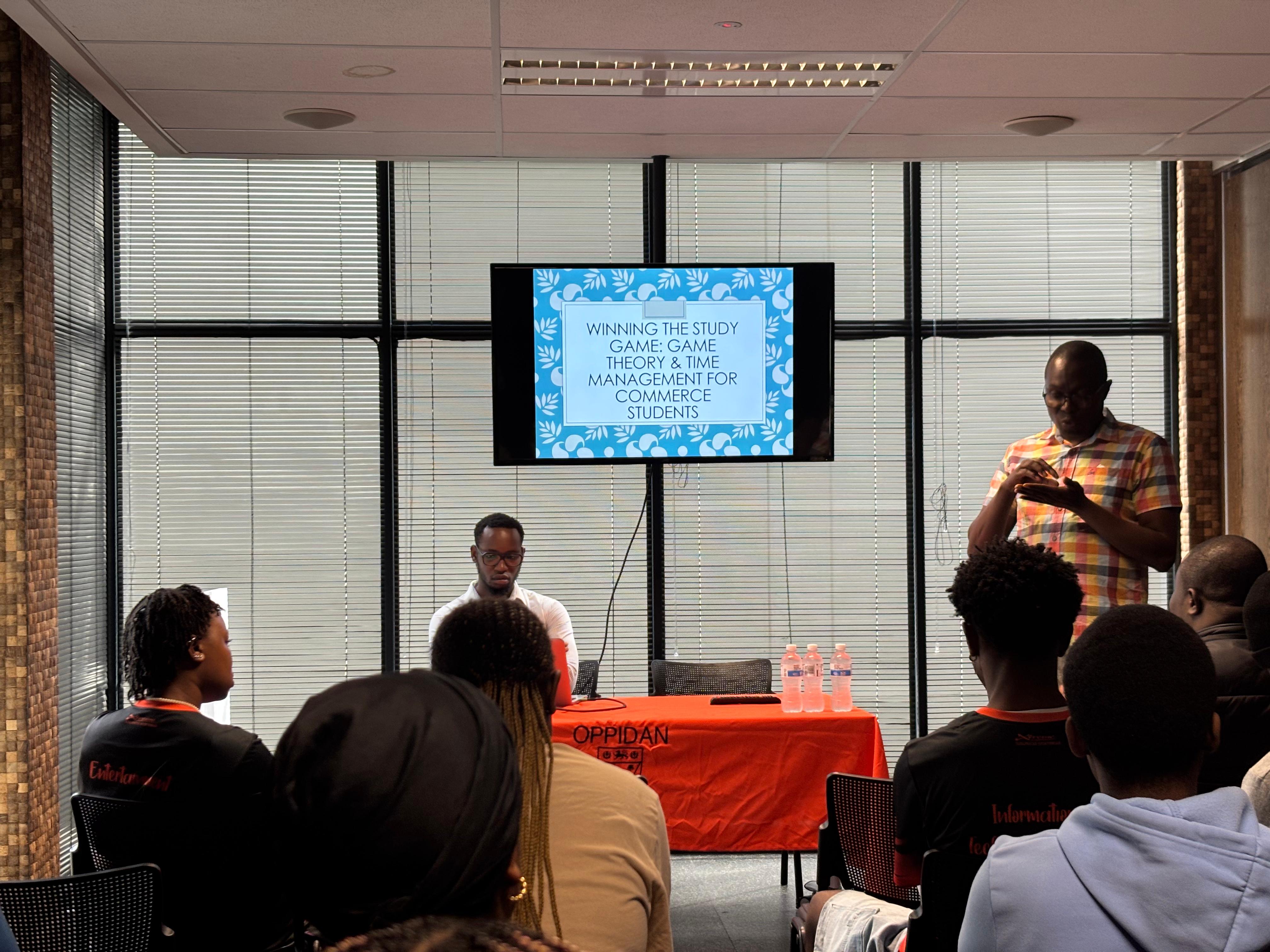![Powerful display at the Amazwi South African Museum of Literature prompting critical thought [PHOTO CREDIT: Oppidan Media]](/media/rhodesuniversity/content/communicationsmarketing/images/Oppi_Study_Skills_2.jpg)
By: Ephreeda Banda
To empower students with effective academic strategies and promote well-being during exam season, the Oppidan Hall Committee, together with the Division for Student Services and Development (DSSD) and the Centre for Higher Education Research, Teaching and Learning (CHERTL), hosted a comprehensive Study Skills and Exam Preparation Workshop for Oppidan students ahead of the mid-semester exams at Amazwi South African Museum of Literature.
Students were grouped according to their faculties for tailored support and guidance. Each group participated in sessions led by a blend of academic staff and senior students who shared professional insight and personal strategies for academic success.
Led by Dr Yonela Ndabula from CHERTL, the Humanities and Education students began their session with a tour of the Amazwi South African Museum of Literature, grounding the discussion in literary heritage and self-reflection. Dr Ndabula guided students through questions like “How, when, and where do you prepare for exams?” and encouraged self-assessment and planning. She emphasised the importance of being organised and finding the best personal study method. Simbulele Muleka, a first-year master’s student in Journalism and Media Studies, shared practical advice about discipline, consistent revision, and doing prior research on modules to better engage with lectures. Both speakers stressed the importance of emotional intelligence, rest, and mental wellness as vital to academic success.
The Pharmacy and Science group was facilitated by Ms Gcobisa Ngodwane, a Pharmacy Practice lecturer, and Lorah Dzimwasha, a second-year Pharmacology master’s student. Ms Ngodwane spoke on holistic preparation, encouraging students to care for their emotional, mental, and physical well-being, particularly during exams. She also highlighted the importance of unpacking and understanding exam questions thoroughly. Lorah reinforced this advice and left attendees with two guiding principles that have helped her: “Do not do tomorrow what you can do today,” and “Trust yourself - be dependable.” She explained how these values contribute to both academic and personal growth.
For Commerce students, Mr Simba Gotora was joined by Mr Amon Magadza, Co-ordinator of Computer Literacy in CHERTL’s Extended Studies Department, and third-year student Munashe Denzel Zawani. Mr Gotora offered valuable insights into lecturer expectations and encouraged students to engage actively with course outlines and lecture slides. He advised students not to rely on past exam papers overly, but instead to use them as a general guide. He also stressed the importance of tailoring one’s study approach depending on the subject, noting that, for example, studying for Management differs from studying for Accounting. Munashe shared lessons on Game Theory, time management, and the value of collaborative learning. He urged students to avoid competitiveness and instead work with peers who excel in specific modules. “Getting high marks means little if you can’t apply the knowledge,” he said, underscoring the importance of building consistent habits and planning effectively.
Mr Philip Bothma, a Law lecturer, facilitated the session for Law students, focusing on legal writing and case analysis. He provided in-depth knowledge on tackling legal articles and responding to case questions with structure and precision. His key advice was to “plan like a lawyer,” encouraging students to approach legal problems with real-world logic and clarity. He explained how this mindset helps not only in exams but also in professional legal practice.
Across all groups, common themes emerged, including interpreting exam questions, effective time management, and building academic support networks. Emotional wellness was consistently highlighted as essential for academic success. Students were also given PowerPoint presentations that addressed common exam mistakes, explained command words, and introduced techniques for interpreting questions. They also completed a Study Skills Self-Assessment to reflect on their strengths and areas for improvement, including notetaking, concentration, and time use.
The workshop builds on the Masabelane Project, an initiative introduced by the 2023 Oppidan Committee, which promotes academic information-sharing among students. This year’s edition included academic staff responding to student requests for expert input, particularly from those who assess exam scripts.
Phiwokuhle Mnge, Residence Student Assistant and Acting Academic and Mentorship Representative, highlighted that the workshop aligns with Rhodes University’s Institutional Development Plan (IDP) Goal 3: to foster a transformative student experience, and IDP 2.2, which focuses on academic access and bridging support for local learners. “This initiative creates a space for engagement, questions, and learning, not only from experts but from each other,” she said.
As part of the follow-up, mentors will meet with their first-year mentees during the first week of Term 3 to reflect on mid-semester exam outcomes. Additional workshops, such as “How to Save the Semester/Year”, will also be offered to support students who need further academic assistance. Students are encouraged to join programs like the Ncedana Student Peer Mentoring Programme.
The Oppidan Committee continues cultivating a community of academic excellence, personal wellness, and mutual empowerment through collaboration among academic staff, senior students, and student support structures.

